Best Creatine Monohydrate Supplements In India (2025 Update)
Are you having difficulty choosing the best creatine monohydrate in India? We bring you the top creatine supplement options to help you put your worries to rest and make an informed decision.
From fitness enthusiasts to bodybuilders, creatine monohydrate has become an essential supplement for anyone looking to build muscle and lose weight. And in India, the demand for high-quality creatine supplements has steadily increased in recent years.
With so many options available in the market, choosing the right creatine supplement can be overwhelming. This comprehensive guide provides you with India’s most popular and effective creatine monohydrate supplements to take your fitness journey to the next level.
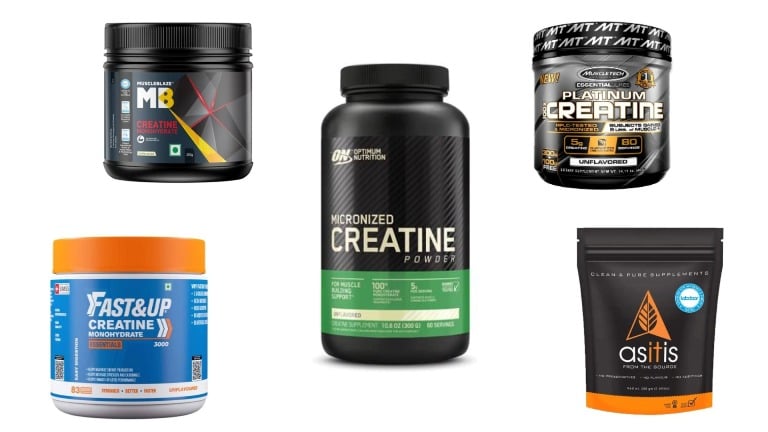
- 7 Best Creatine Supplements In India
- 1. Optimum Nutrition (ON) Micronized Creatine Powder
- 2. MuscleTech Platinum 100% Creatine Powder
- 3. Labrada CreaLean Creatine Supplement
- 4. GNC Pro Performance Creatine Monohydrate
- 5. MuscleBlaze Creatine Monohydrate
- 6. AS-IT-IS Nutrition Pure Creatine Monohydrate
- 7. Fast&Up Creatine Monohydrate
- Creatine Supplement Price Comparison
- Understand the Basics of Creatine to Make an Informed Choice
- How Creatine Monohydrate Works
- Types of Creatine Supplements
- How To Choose Good Quality Creatine Supplement
- 1. Safety Certification
- 2. Purity & Ingredients
- 3. Form & Absorption
- 4. Proven Effectiveness
- 5. Value For Money
- 6. Brand Reputation
- Frequently Asked Questions
- References
7 Best Creatine Supplements In India
After evaluating over 20 products based on purity, effectiveness, value, and user feedback, these seven creatine supplements stood out as the best options available in India today.
1. Optimum Nutrition (ON) Micronized Creatine Powder
Optimum Nutrition (ON) Micronized Creatine Powder is a popular supplement designed to help increase muscle strength, power, and size. Produced by world-renowned ON brand, it contains micronized pure creatine monohydrate for improved solubility and absorption rate.
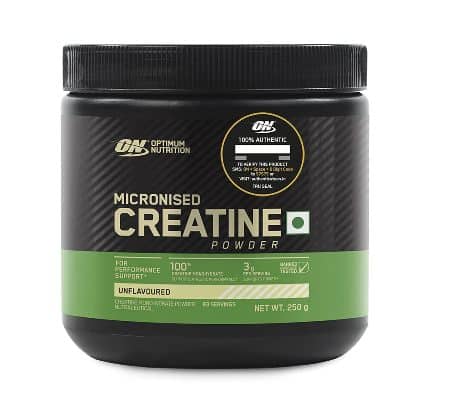
Quick Facts
- Serving size: 3g per serving
- Servings: 83 servings per container (250g)
- Form: 100% pure micronized creatine monohydrate
- Best for: Overall quality and purity
- Pros
- Highly effective at improving muscle strength and power
- Micronized for improved solubility and absorption
- No added fillers or additives
- Easily mixes with any beverage
- Third-party tested for purity and quality
- Trusted by athletes worldwide for over 35 years
- Cons
- Unflavored taste may not be appealing to some users
- Slightly higher price point compared to some alternatives
2. MuscleTech Platinum 100% Creatine Powder
Made by MuscleTech, a well-known fitness brand specializing in sports supplements, this product is HPLC-tested and verified for exceptional quality. It features a suitable texture that is easy to blend with your favorite beverages.
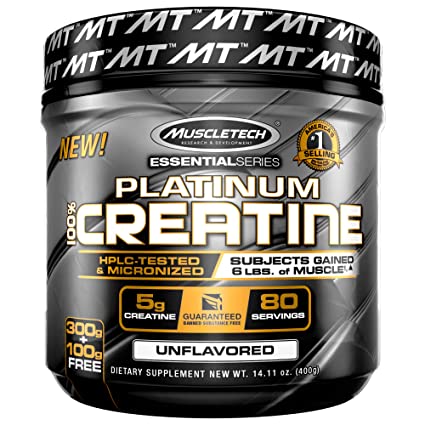
Quick Facts
- Serving size: 3g per serving
- Servings: 133 servings per container (400g)
- Form: Ultra-pure micronized creatine monohydrate
- Best for: Maximum servings per container
- Pros
- Extensively researched and HPLC-tested for purity
- High-quality, pure form of creatine
- Excellent mixability with minimal clumping
- Unflavored, making it versatile for mixing
- More servings per container than most competitors
- Gluten-free and sugar-free formula
- Cons
- Tasteless, which may require mixing with flavored beverages
- Some users report the container is difficult to reseal
3. Labrada CreaLean Creatine Supplement
Produced by Labrada Nutrition, a reputable company in the sports nutrition industry for over 25 years, CreaLean uses high-quality ingredients and follows strict manufacturing standards in GMP-certified facilities to ensure product safety and effectiveness.
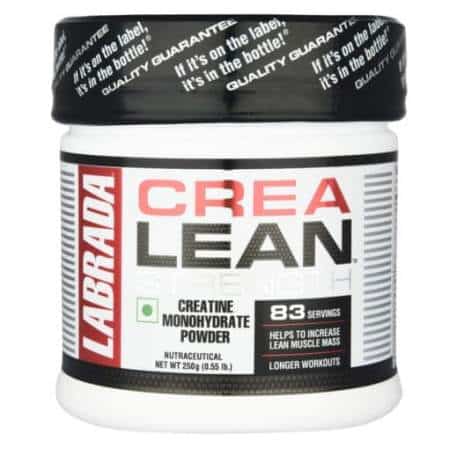
Quick Facts
- Serving size: 3g per serving
- Servings: 83 servings per container (250g)
- Form: 100% pure creatine monohydrate
- Best for: Certified purity and safety
- Pros
- Economically priced compared to similar quality products
- FSSAI and GMP certified, free from unadulterated substances
- Significantly increases muscle strength and endurance
- Enhances athletic performance and recovery
- Free from unnecessary additives or fillers
- Company’s long-standing reputation for quality
- Cons
- May cause bloating or digestive discomfort in some users
- Limited availability in some regions of India
4. GNC Pro Performance Creatine Monohydrate
Produced by GNC Group, a leading global specialty health and wellness retailer with around 9,000 locations worldwide, Pro Performance Creatine Monohydrate is a premium supplement designed to enhance strength, power, and endurance with exceptional quality control.
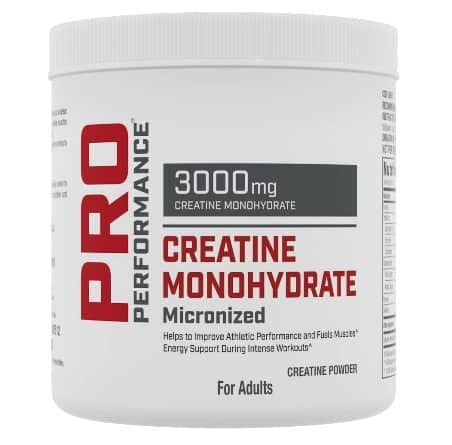
Quick Facts
- Serving size: 3g per serving
- Servings: 83 servings per container (250g)
- Form: 100% pure creatine monohydrate
- Best for: Premium quality and performance
- Pros
- Exceptional performance enhancement and recovery benefits
- Excellent value proposition despite premium pricing
- Free from artificial colors, flavors, and sugars
- Manufactured in GMP-certified facility with rigorous quality testing
- Global brand reputation ensures consistent quality
- Higher absorption rate than many competitors
- Cons
- Unflavored, requiring mixing with flavored beverages
- Premium price point compared to some alternatives
5. MuscleBlaze Creatine Monohydrate
As one of India’s best-selling creatine supplements, MuscleBlaze offers high-quality micronized creatine at an affordable price. Popular among both beginners and experienced athletes, this homegrown brand has established a strong reputation for quality and effectiveness.
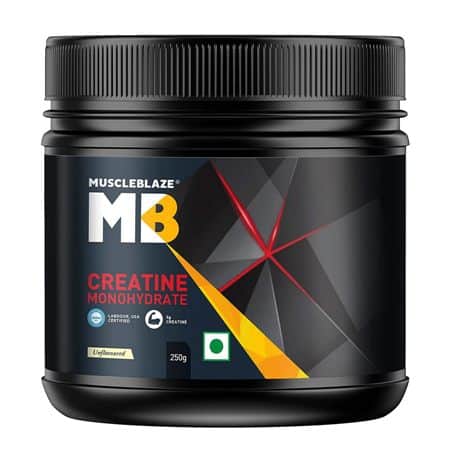
Quick Facts
- Serving size: 3g per serving
- Servings: 83 servings per container (250g)
- Form: 100% pure micronized creatine monohydrate
- Best for: Indian users seeking value and quality
- Pros
- Pure and safe to consume with third-party testing
- Completely unadulterated formula
- Significantly boosts muscle strength and endurance
- Enhances post-workout recovery time
- Very affordable price for the quality offered
- Made in India with local customer support
- Cons
- May cause minor gastrointestinal discomfort in some users
- Packaging quality could be improved
6. AS-IT-IS Nutrition Pure Creatine Monohydrate
AS-IT-IS offers a high-quality, budget-friendly creatine supplement made with pure creatine monohydrate. This no-frills product focuses on delivering the most effective form of creatine for increasing athletic performance at an affordable price point.
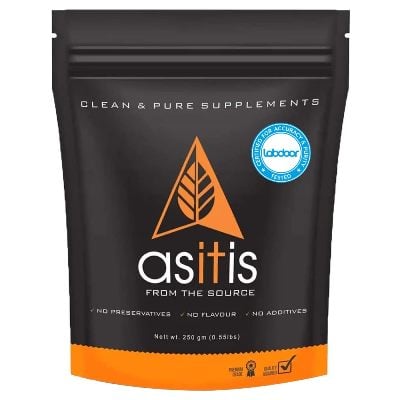
Quick Facts
- Serving size: 2.5g per serving
- Servings: 100 servings per container (250g)
- Form: Pure creatine monohydrate
- Best for: Budget-conscious users
- Pros
- Highly effective for increasing muscle mass and strength
- Very affordable price point
- Easy to use with excellent mixability
- Unflavored for versatile mixing options
- Gluten-free and non-GMO formula
- Lab-tested for purity and safety
- Cons
- May cause bloating or stomach upset in sensitive individuals
- Slightly smaller recommended serving size than competitors
7. Fast&Up Creatine Monohydrate
Fast&Up Creatine Monohydrate helps level up your workouts with strength and power. This ultra-micronized formula provides instant and sustained energy while improving athletic performance with excellent digestibility.
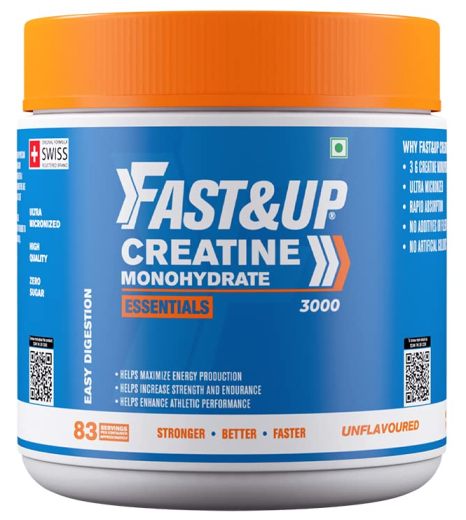
Quick Facts
- Serving size: 3g per serving
- Servings: 83 servings per container (250g)
- Form: Ultra-micronized creatine monohydrate
- Best for: Enhanced digestibility and absorption
- Pros
- Ultra-micronized formula for superior digestion and absorption
- Competitively priced for the quality offered
- Excellent mixability with various beverages
- Third-party tested for purity
- Made in India with local support
- Lower incidence of digestive discomfort compared to competitors
- Cons
- Unflavored formula may not appeal to all users
- Some users report mild digestive discomfort initially
Creatine Supplement Price Comparison
Here’s a detailed price and rating comparison of top creatine supplements available in India to help you make a cost-effective decision:
| Product Name | Price (₹) | Quantity | Per Serving Cost | Rating |
|---|---|---|---|---|
| Optimum Nutrition (ON) Micronized Creatine | 999 | 250g (83 servings) | ₹12.0 | 4.2/5 |
| MuscleTech Platinum 100% Creatine | 1,099 | 400g (133 servings) | ₹8.3 | 4.1/5 |
| Labrada CreaLean Powder | 1,079 | 250g (83 servings) | ₹13.0 | 4.2/5 |
| GNC Pro Performance Creatine | 1,099 | 250g (83 servings) | ₹13.2 | 4.3/5 |
| MuscleBlaze Creatine Monohydrate | 999 | 250g (83 servings) | ₹12.0 | 4.2/5 |
| AS-IT-IS Nutrition Creatine | 797 | 250g (100 servings) | ₹8.0 | 4.1/5 |
| Fast&Up Creatine Monohydrate | 909 | 250g (83 servings) | ₹11.0 | 4.2/5 |
Read More: Best Plant Protein Powder In India
Understand the Basics of Creatine to Make an Informed Choice
Creatine is a naturally occurring organic compound found in muscle cells and various organs in the human body. It’s made up of three amino acids: arginine, glycine, and methionine, and provides energy to cells—particularly muscle cells—during high-intensity, short-duration activities like weightlifting or sprinting.
Creatine Benefits At A Glance
- Muscle strength: Increases power output during high-intensity exercise
- Muscle growth: Enhances protein synthesis and cell volumization
- Recovery: Reduces muscle damage and inflammation
- Performance: Improves exercise capacity and training volume
While creatine can be obtained through diet (primarily from animal products like red meat and fish), the body also produces small amounts naturally. However, studies have shown that supplementation significantly increases muscle creatine stores beyond what diet alone can provide.
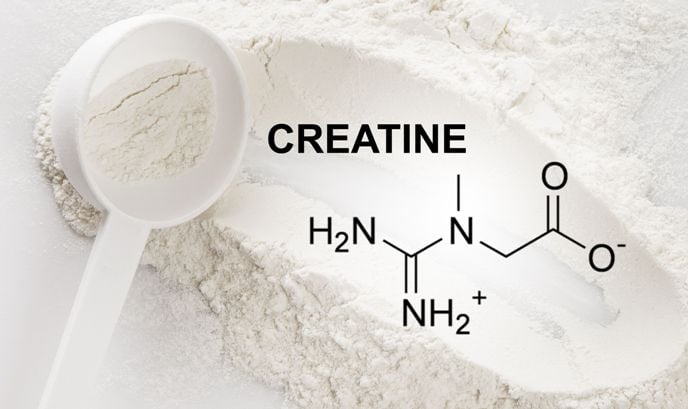
How Creatine Monohydrate Works
When you consume creatine, it’s transported to your skeletal muscles where it’s converted into phosphocreatine (creatine phosphate). This conversion is critical for producing adenosine triphosphate (ATP), the primary energy currency your cells use during physical activities.
During high-intensity exercise, your muscles rapidly deplete ATP. Phosphocreatine serves as an immediate energy reserve to regenerate ATP, allowing you to maintain higher intensity for longer periods. This explains why creatine supplementation can improve performance in activities requiring bursts of power.
Beyond energy production, creatine monohydrate has been shown to promote muscle protein synthesis by activating the mTOR pathway, which is responsible for muscle growth and recovery.
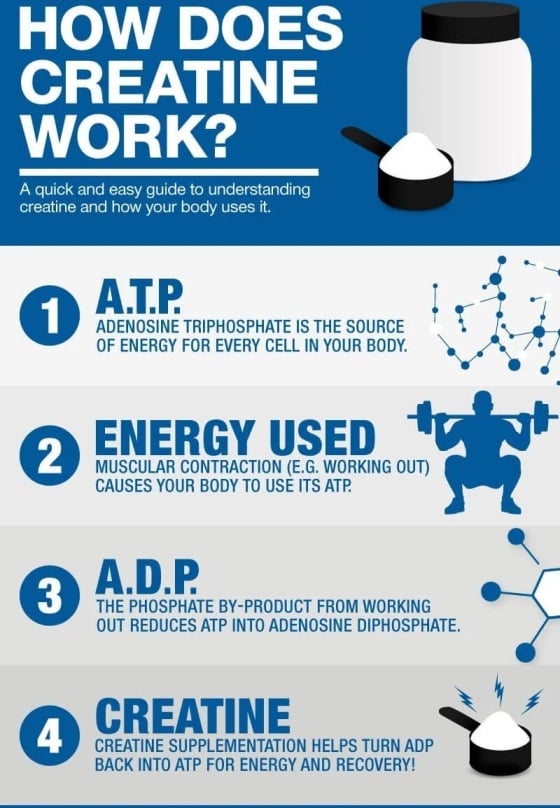
Types of Creatine Supplements
While several forms of creatine exist on the market, they differ in solubility, absorption, and effectiveness. Here’s a comparison of the most common types:
The gold standard form of creatine backed by hundreds of studies. It consists of a creatine molecule bound to a water molecule.
Key Benefits:
- Most extensively researched
- Cost-effective
- Proven safety record
- Excellent efficacy
Regular creatine monohydrate processed to create smaller particles for improved dissolution and absorption.
Key Benefits:
- Superior mixability
- Reduced digestive discomfort
- Potentially better absorption
- Less gritty texture
Creatine bound to hydrochloric acid, claimed to have enhanced solubility and require smaller doses.
Key Benefits:
- Higher water solubility
- Smaller recommended dosages
- Less bloating for some users
- May improve absorption
Creatine with an alkaline buffer (often marketed as Kre-Alkalyn) designed to reduce conversion to creatinine in the stomach.
Key Benefits:
- Reduced digestive discomfort
- May improve stability
- Claims better bioavailability
- Often requires smaller doses
Want to take your gains to the next level? Discover your daily calorie needs with our free TDEE calculator
How To Choose Good Quality Creatine Supplement
Selecting a high-quality creatine supplement is crucial for maximizing benefits while ensuring safety. Here are the key factors to consider when making your purchase:
1. Safety Certification
Always look for products with proper certifications. In India, check for FSSAI approval. Internationally recognized certifications like NSF, Informed Choice, or USP verification provide additional assurance that the supplement has been tested for banned substances and contains what’s listed on the label.
2. Purity & Ingredients
Choose products with minimal ingredients—ideally just pure creatine monohydrate without unnecessary fillers, artificial colors, or sweeteners. The label should specify the exact type of creatine and its concentration (usually 99-100% pure). Third-party testing verification on the packaging is a significant plus.
3. Form & Absorption
Micronized creatine offers better mixability and potentially improved absorption. If you experience digestive discomfort with standard creatine monohydrate, consider micronized versions which may be gentler on the stomach while maintaining effectiveness.
4. Proven Effectiveness
Creatine monohydrate has the strongest research backing its effectiveness. Despite marketing claims, alternative forms haven’t consistently demonstrated superior results in controlled studies. When in doubt, stick with monohydrate—it’s the gold standard.
5. Value For Money
Calculate the cost per serving rather than just looking at the total price. A slightly more expensive product might offer more servings, making it more economical in the long run. Remember that overpriced “premium” versions often don’t deliver additional benefits.
6. Brand Reputation
Established brands with positive reviews and transparent manufacturing practices are generally more reliable. Research the company’s history, customer feedback, and whether they’ve faced any quality control issues or recalls in the past.
Red Flags to Watch For
- Proprietary blends: When creatine is mixed with other ingredients without specifying amounts
- Extravagant claims: Promises that sound too good to be true usually are
- Missing certifications: No third-party testing or quality assurance
- Suspiciously low prices: Could indicate impure or substandard product
Frequently Asked Questions
How should I take creatine for optimal results?
For optimal results, follow this protocol:
- Loading Phase (optional): Take 20 grams divided into 4-5 doses (5g each) daily for 5-7 days to rapidly saturate muscle stores.
- Maintenance Phase: Consume 3-5 grams daily to maintain elevated creatine levels.
- Timing: While creatine can be taken any time, research suggests taking it post-workout may be slightly more beneficial due to increased insulin sensitivity and nutrient uptake.
- Consistency: Daily supplementation is more important than timing—muscle saturation depends on regular intake.
- Hydration: Drink plenty of water throughout the day as creatine increases water retention in muscles.
Is a loading phase necessary for creatine supplementation?
A loading phase isn’t strictly necessary but accelerates results. With a standard maintenance dose of 3-5g daily, it can take up to 28 days to fully saturate muscle creatine stores. Using a loading protocol of 20g daily (divided into smaller doses) for 5-7 days saturates muscles much faster, allowing you to experience benefits sooner.
If you’re concerned about digestive discomfort or water retention during loading, you can skip this phase without compromising long-term results—you’ll simply reach full saturation more gradually. Both approaches ultimately achieve similar creatine levels in muscle tissue.
What is the best time to take creatine?
Research shows creatine timing has minimal impact on overall effectiveness once muscles are saturated. However, there are some timing strategies that might offer slight advantages:
- Post-workout: Taking creatine after training may be optimal as muscle cell receptivity to nutrients increases, and when combined with carbohydrates and protein, insulin can enhance creatine uptake.
- Pre-workout: Some users report immediate performance benefits from pre-workout consumption, though this is likely psychological for most.
- Daily consistency: The most important factor is taking creatine regularly—consistent daily supplementation matters more than specific timing.
For convenience, many people take creatine with their post-workout shake or with a meal containing carbohydrates.
What are the proven benefits of creatine supplementation?
Creatine is one of the most well-researched supplements with numerous scientifically validated benefits:
- Increased Strength: Consistently shown to improve maximal power and strength by 5-15% on average.
- Enhanced Exercise Performance: Improves high-intensity exercise capacity and performance in activities like sprinting and weight lifting.
- Accelerated Recovery: Reduces muscle damage markers and inflammation after intense exercise.
- Increased Muscle Mass: Supports faster gains in lean body mass when combined with resistance training.
- Improved Training Volume: Allows athletes to train harder and longer, creating greater stimulus for adaptation.
- Cognitive Benefits: Emerging research suggests potential neuroprotective effects and improved brain function, especially in vegetarians with lower baseline creatine levels.
Does creatine help with fat loss?
Creatine doesn’t directly burn fat or increase metabolism significantly. However, it can indirectly support fat loss efforts through several mechanisms:
- Increased Work Capacity: By enhancing your ability to train harder and longer, you’ll burn more calories during workouts.
- Muscle Preservation: During caloric deficits, creatine helps maintain lean muscle mass, which is metabolically active tissue that contributes to higher resting energy expenditure.
- Improved Training Performance: Better performance during resistance training supports muscle maintenance/growth, again supporting metabolic health.
For best results, combine creatine with a proper fat loss diet and consistent exercise routine rather than viewing it as a fat-burning supplement.
Is creatine supplementation safe for the liver and kidneys?
Based on extensive research including over 500 studies, there is no scientific evidence suggesting that creatine monohydrate at recommended doses harms liver or kidney function in healthy individuals. Key points:
- Multiple long-term studies (up to 5 years) show no adverse effects on kidney or liver function markers.
- The body naturally processes creatine, and healthy kidneys easily excrete the byproduct creatinine.
- Individuals with pre-existing kidney or liver conditions should consult healthcare providers before supplementation.
- Staying well-hydrated while taking creatine is always recommended.
The International Society of Sports Nutrition has officially declared creatine monohydrate as safe when used as directed.
Can I take creatine with whey protein?
Yes, creatine and whey protein work well together and may actually offer synergistic benefits:
- The two supplements have different but complementary mechanisms of action.
- Protein’s insulin response may enhance creatine uptake into muscle cells.
- Many users find it convenient to mix creatine into their protein shake.
- This combination supports both immediate recovery (protein) and energy replenishment (creatine).
- No adverse interactions between these supplements have been reported in research.
For best mixability, add creatine to your protein shake after the protein powder has been mixed, as this reduces clumping.
Is creatine a steroid or hormone?
No, creatine is neither a steroid nor a hormone. It is a naturally occurring compound made from three amino acids (glycine, arginine, and methionine) that’s found in muscle cells and various foods like meat and fish. Unlike steroids which alter hormone levels and can cause numerous side effects, creatine:
- Does not affect hormone production
- Is legal and approved for use in sports
- Doesn’t build muscle without exercise
- Works through energy production rather than hormonal mechanisms
- Has an extensive safety profile with minimal side effects
Creatine is classified as a nutritional supplement and is one of the most thoroughly researched sports supplements available.
What potential side effects should I be aware of?
While creatine is generally considered safe for most people, some potential side effects may occur:
- Water Retention: Initial weight gain (1-2 kg) from increased water in muscle cells, which usually stabilizes after the first week.
- Digestive Discomfort: Some users experience bloating, stomach cramps, or diarrhea, especially during loading phases or with large single doses.
- Dehydration Risk: Increased water requirements mean staying well-hydrated is essential.
- Muscle Cramps: Occasionally reported, though research hasn’t consistently confirmed this connection.
To minimize side effects: start with smaller doses, stay well-hydrated, consider micronized creatine for better digestion, and take with meals rather than on an empty stomach. If side effects persist, consult a healthcare professional.
References
- The Editors of Encyclopedia Britannica. (2016, August 19). Adenosine triphosphate. Encyclopedia Britannica.
- Branch, J. D. (2003). Effect of creatine supplementation on body composition and performance: a meta-analysis. International Journal of Sport Nutrition and Exercise Metabolism, 13(2), 198-226.
- Rawson, E. S., & Volek, J. S. (2003). Effects of creatine supplementation and resistance training on muscle strength and weightlifting performance. Journal of Strength and Conditioning Research, 17(4), 822-831.
- Santos, R. V., Bassit, R. A., Caperuto, E. C., & Costa Rosa, L. F. (2004). The effect of creatine supplementation upon inflammatory and muscle soreness markers after a 30km race. Life Sciences, 75(16), 1917-1924.
- Stoll, B., Gerok, W., Lang, F., & Haussinger, D. (1992). Liver cell volume and protein synthesis. Biochemical Journal, 287(1), 217-222.
- Kreider, R. B., Kalman, D. S., Antonio, J., Ziegenfuss, T. N., Wildman, R., Collins, R., … & Lopez, H. L. (2017). International Society of Sports Nutrition position stand: safety and efficacy of creatine supplementation in exercise, sport, and medicine. Journal of the International Society of Sports Nutrition, 14(1), 18.
- Buford, T. W., Kreider, R. B., Stout, J. R., Greenwood, M., Campbell, B., Spano, M., … & Antonio, J. (2007). International Society of Sports Nutrition position stand: creatine supplementation and exercise. Journal of the International Society of Sports Nutrition, 4(1), 6.

Manish is a NASM-certified fitness and nutrition coach with over 10 years of experience in weight lifting and fat loss fitness coaching. He specializes in gym-based training and has a lot of knowledge about exercise, lifting technique, biomechanics, and more.
Through “Fit Life Regime,” he generously shares the insights he’s gained over a decade in the field. His goal is to equip others with the knowledge to start their own fitness journey.
